National Health Center Week: Celebrating Our Provider Organizations
August 2 2021
National Health Center Week (Sunday, August 8—Saturday, August 14) is a celebration of the mission and accomplishments of health centers. Community Health Centers (CHCs) in the U.S. serve as a beacon of strength, service, and care in communities most deeply impacted by health disparities. This was—and still is—especially true during the COVID-19 pandemic, when CHCs found innovative ways to provide preventative and primary care to their patients.
At Amida Care, the work of our providers is integral to the success of our unique model of care, which provides comprehensive health coverage and coordinated care to members living with HIV/AIDS and other complex conditions. We are honoring National Health Center Week by highlighting the work of CHC providers as well as our sponsor provider organizations, each of which has played a crucial role in providing specialized health services for communities in need.
Acacia Network: A Client Gives Back to the Community
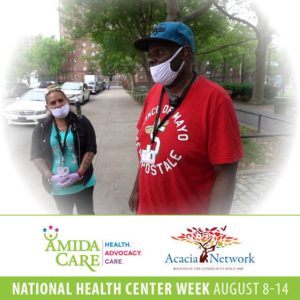 Shaun Nichols is a patient of Acacia Network’s Casa Maria Community Health Center (a Federally Qualified Health Center or FQHC), where he receives integrated primary care and behavioral health services, medication assisted treatment, and HIV case management and support services through Acacia Network’s care coordination redesign program. Shaun initially came to Acacia Network through their substance use and addiction treatment programs. Once he became committed to his recovery, he began volunteering in Acacia Network’s Bronx Opioid Collective Project as a way to give back to the community and help others like him get the help they need.
Shaun Nichols is a patient of Acacia Network’s Casa Maria Community Health Center (a Federally Qualified Health Center or FQHC), where he receives integrated primary care and behavioral health services, medication assisted treatment, and HIV case management and support services through Acacia Network’s care coordination redesign program. Shaun initially came to Acacia Network through their substance use and addiction treatment programs. Once he became committed to his recovery, he began volunteering in Acacia Network’s Bronx Opioid Collective Project as a way to give back to the community and help others like him get the help they need.
Today, Shaun works as a peer health outreach worker as part of the Bronx Opioid Collective, a harm reduction outreach program launched by Acacia Network in 2018, in collaboration with the New York City Council and the Office of Council Member Rafael Salamanca, Jr. and the Third Avenue BID. He remains committed to his sobriety, wellness and recovery, and enjoys helping others.
“I feel there is no better way to give back what was so freely given to me. This is why I do the peer support work. I can identify with active users and understand what they are going through on any given day,” says Shaun. Watch videos highlighting the Bronx Opioid Collective and Acacia Network’s Promesa Residential Rehabilitation Services for Youth program, a residential program that serves youth ages 14-20 with addiction and substance use disorders.
Apicha Community Health Center: Serving Underserved New Yorkers
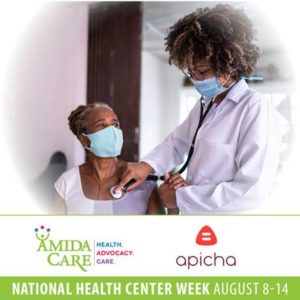 Apicha Community Health Center provides affordable health care for underserved people in New York City, offering a full range of medical services including primary care, HIV services, HIV prevention PrEP/PEP Services, behavioral health services, and HIV/STI testing.
Apicha Community Health Center provides affordable health care for underserved people in New York City, offering a full range of medical services including primary care, HIV services, HIV prevention PrEP/PEP Services, behavioral health services, and HIV/STI testing.
Apicha’s Transgender Health Clinic is committed to providing comprehensive primary medical care to address the distinct needs of transgender, gender non-conforming, gender variant, and genderqueer individuals of all backgrounds. Along with personalized primary care, Apicha’s Transgender Health Clinic assists with initiation and maintenance of hormone therapy, referrals for gender-affirming surgeries, short-term behavioral health services, access to PrEP, assistance with social services (name change, legal documents, etc.), and care management. Apicha also offers non-medical services such as SNAP and medical insurance enrollment, plus community youth initiatives, including GAYME (GLBTQI Asian and Pacific Islander Youth Mentorship for Empowerment), a program which connects LGBTQI API youth with other youth and adults to share their experiences.
Callen-Lorde Community Health Center: Sensitive, Quality Health Care
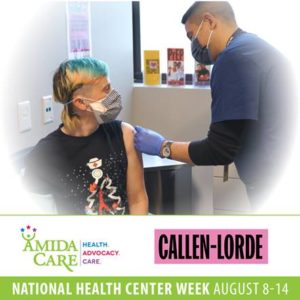 A global leader in LGBTQ healthcare. Callen-Lorde Community Health Center has transformed lives in LGBTQ communities through high-quality comprehensive care, provided free of judgment and regardless of ability to pay. Callen-Lorde has provided ongoing services throughout the current COVID-19 pandemic, offering COVID-19 vaccinations across Brooklyn, the Bronx, and Manhattan, including distribution sites at Javits Center and Yankee Stadium. Callen-Lorde also promotes health education and wellness, and advocates for LGBTQ health issues.
A global leader in LGBTQ healthcare. Callen-Lorde Community Health Center has transformed lives in LGBTQ communities through high-quality comprehensive care, provided free of judgment and regardless of ability to pay. Callen-Lorde has provided ongoing services throughout the current COVID-19 pandemic, offering COVID-19 vaccinations across Brooklyn, the Bronx, and Manhattan, including distribution sites at Javits Center and Yankee Stadium. Callen-Lorde also promotes health education and wellness, and advocates for LGBTQ health issues.
Callen-Lorde’s Health Outreach To Teens (HOTT) is a welcoming, confidential program designed specifically to meet the medical and mental health needs of LGBTQ adolescents and young adults ages 13-24, as well as other young people in need. Services are offered both onsite and through a mobile medical unit that travels to areas throughout the five boroughs to meet people where they feel comfortable. HOTT services include medical services, counseling and mental health, psychiatry, care coordination, and health education. All of HOTT’s services are provided free of charge or at low cost (insurance is also accepted). After clients’ 24th birthday, they will be transitioned into adult care.
Community Healthcare Network (CHN): Bringing Care to Communities Hardest Hit by COVID-19
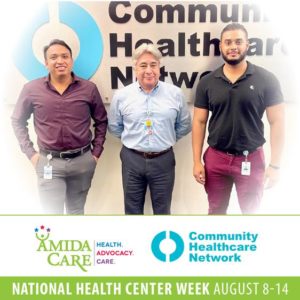 Abad Sanchez first stepped into the Community Healthcare Network (CHN) Mobile Youth Access Program (YAP) in Jackson Heights, Queens, in fall 2019. Like other immigrants in the neighborhood, Abad struggled to access affordable health care services. He was surprised to learn that YAP offered not only primary care, social services, HIV and STI testing and treatment, and PEP/PrEP services – but all services were available regardless of his immigration status or ability to pay.
Abad Sanchez first stepped into the Community Healthcare Network (CHN) Mobile Youth Access Program (YAP) in Jackson Heights, Queens, in fall 2019. Like other immigrants in the neighborhood, Abad struggled to access affordable health care services. He was surprised to learn that YAP offered not only primary care, social services, HIV and STI testing and treatment, and PEP/PrEP services – but all services were available regardless of his immigration status or ability to pay.
YAP services are representative of CHN’s overall mission – to provide affordable, culturally sensitive, and comprehensive community-based primary care, reproductive health, nutrition, behavioral health, and social services for New Yorkers who may otherwise have little or no access to critical health care. The mobile YAP unit is part of CHN’s Federally Qualified Health Center (FQHC) network, which includes 14 sites across New York City and serves over 80,000 residents per year.
In May 2020, CHN’s YAP Manager Harvey Diaz brought Abad on board as a Community Educator. Due to COVID-19, CHN had to adjust operations and scheduling to accommodate patients both face-to-face and via telehealth and telephonic care. Under the leadership of CHN’s Vice President of Infectious Diseases and LBGTQ+ Programs and Services, Dr. Freddy Molano, CHN established its own community-based vaccine pop-up sites in February 2021, in partnership with community- and faith-based organizations. These sites were designed for individuals considered “hard-to-reach” and communities, mostly Black and Latinx, showing the lowest rates of COVID-19 vaccination. Queens immigrant communities needed to feel safe with vaccine providers, so YAP staff called patients one-on-one. As a YAP patient himself, Abad had patients’ trust and could refer them to CHN pop-up sites for the vaccine. As of July 2021, CHN has vaccinated over 75 YAP patients and over 1,300 individuals at its vaccine sites in Queens, Brooklyn, and the Bronx. Nearly 68% vaccine recipients are Black and/or Latinx.
Harlem United: Meeting the Pandemic Head-On
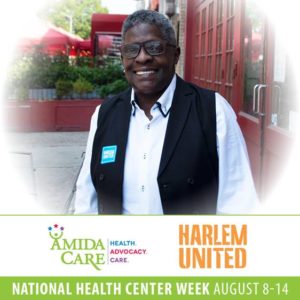 “I was diagnosed with HIV in 1991-92. I’m still here, 30 some years later. Harlem United had a lot to do with it. Back then, we were scared. Everyone would say, ‘I hope it’s not me, I hope it’s not my day.’ But for some reason, Harlem United didn’t look at it like we were gonna die. They would talk to us like regular, normal, like, ‘Y’all gonna be alright.’ We were lucky to have people even deal with us because nobody even wanted to touch us. Harlem United was there when no one was there. COVID-19 is the second pandemic. The same fear with AIDS came back when COVID hit. But it helped me because I had been there. When the vaccine came out, I was one of the first people – I was there in January! Harlem United called and said, ‘Jade, come get the vaccine; we got it!’” — Jade
“I was diagnosed with HIV in 1991-92. I’m still here, 30 some years later. Harlem United had a lot to do with it. Back then, we were scared. Everyone would say, ‘I hope it’s not me, I hope it’s not my day.’ But for some reason, Harlem United didn’t look at it like we were gonna die. They would talk to us like regular, normal, like, ‘Y’all gonna be alright.’ We were lucky to have people even deal with us because nobody even wanted to touch us. Harlem United was there when no one was there. COVID-19 is the second pandemic. The same fear with AIDS came back when COVID hit. But it helped me because I had been there. When the vaccine came out, I was one of the first people – I was there in January! Harlem United called and said, ‘Jade, come get the vaccine; we got it!’” — Jade
Because Harlem United’s clients typically come from communities of color and/or have underlying conditions that make them more susceptible to COVID-19, Harlem United swung immediately into action to create a multi-pronged COVID-19 response strategy. Harlem United continued all of its services throughout the pandemic, implementing telehealth visits to provide mental health and drug-use related services to more people struggling with the pressures of the pandemic; initiating a public service campaign to educate underserved communities about COVID-19; and vaccinating eligible New Yorkers to protect against COVID-19.
During the pandemic, Harlem United provided 4,400 telehealth visits for mental health care; more than 1,200 vaccine doses were administered in January and February 2021; and 100 smart phones were distributed to clients to access telehealth.
Housing Works: Housing is Health Care
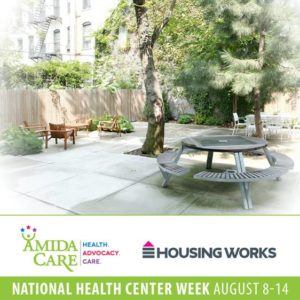 Since 1990, Housing Works has provided a comprehensive array of services to more than 30,000 homeless and low-income New Yorkers living with and affected by HIV/AIDS. Its mission is to end the dual crises of homelessness and HIV/AIDS through advocacy, the provision of lifesaving services, and entrepreneurial businesses that sustain its efforts. A core value of the organization is that housing is health care: providing stable housing is the first step toward living a long and healthy life. This is an especially important concept for people living with HIV, as it has been proven that stable housing is crucial to achieving viral suppression.
Since 1990, Housing Works has provided a comprehensive array of services to more than 30,000 homeless and low-income New Yorkers living with and affected by HIV/AIDS. Its mission is to end the dual crises of homelessness and HIV/AIDS through advocacy, the provision of lifesaving services, and entrepreneurial businesses that sustain its efforts. A core value of the organization is that housing is health care: providing stable housing is the first step toward living a long and healthy life. This is an especially important concept for people living with HIV, as it has been proven that stable housing is crucial to achieving viral suppression.
Housing Works provides safe, secure, and stable housing to homeless New Yorkers living with HIV/AIDS and/or other chronic health conditions. Once residents have been stabilized in their healing Housing Works homes, they are connected to other life-saving services, as Housing Works coordinates with their health care providers to ensure that all of their needs are met. Housing is available to eligible individuals living with HIV; people of transgender experience living with HIV; single men and women with active substance use issues; HIV-positive single women recently released from a correctional setting; and HIV-positive LGBTQ youth (ages 18 to 24). Housing Works also offers supportive, affordable housing for families where the head-of-household is living with HIV. Other Housing Works services include health care, meals and nutritional counseling, mental health and substance use treatment, job training, and legal assistance.
St. Mary’s Center: Pointing People in the Right Direction
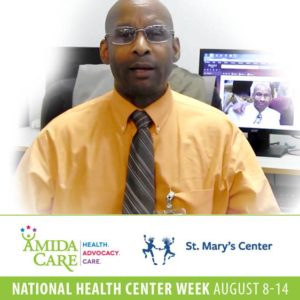 St. Mary’s broad clinical and social health services include substance abuse counseling, which utilizes the Harm Reduction Model: Individuals are accepted wherever they are in their current AOD (Alcohol and Other Drug) using behavior, and the center coordinates appropriate intervention for the many different levels of change presented by the client (Pre-Contemplation, Contemplation, Preparation, Action, Maintenance and Relapse). St. Mary’s offers therapeutic groups for individuals who are still in active addiction, who are abstinent from one substance, and those who are abstinent from all substances. The center also hosts a weekly, self-supporting Narcotics Anonymous (NA) meeting, and coordinates with insurance companies to admit clients for Detox and 28-day inpatient Drug Rehab Programs as clinically indicated.
St. Mary’s broad clinical and social health services include substance abuse counseling, which utilizes the Harm Reduction Model: Individuals are accepted wherever they are in their current AOD (Alcohol and Other Drug) using behavior, and the center coordinates appropriate intervention for the many different levels of change presented by the client (Pre-Contemplation, Contemplation, Preparation, Action, Maintenance and Relapse). St. Mary’s offers therapeutic groups for individuals who are still in active addiction, who are abstinent from one substance, and those who are abstinent from all substances. The center also hosts a weekly, self-supporting Narcotics Anonymous (NA) meeting, and coordinates with insurance companies to admit clients for Detox and 28-day inpatient Drug Rehab Programs as clinically indicated.
Watch this inspiring success story about a client’s recovery from addiction with the help of St. Mary’s services. He currently works at the front desk of the facility, where he “points people in the right direction.”
Sun River Health: Food Access Programs and Nutrition Services
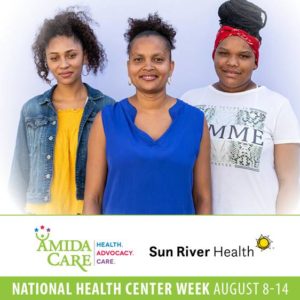 Access to healthy and affordable food is critical to good health, and Sun River Health understands that many people in the neighborhoods it serves do not know where their next meal is coming from. Many Sun River Health centers offer direct local pantry services where anyone who needs healthy food can get it. Additionally, experts at Sun River’s health centers can help enroll clients in the Supplemental Nutrition Assistance Program (SNAP).
Access to healthy and affordable food is critical to good health, and Sun River Health understands that many people in the neighborhoods it serves do not know where their next meal is coming from. Many Sun River Health centers offer direct local pantry services where anyone who needs healthy food can get it. Additionally, experts at Sun River’s health centers can help enroll clients in the Supplemental Nutrition Assistance Program (SNAP).
In addition to food pantries at select locations, Sun River Health offers other food security programs and partnerships including a network of community food pantry partners; food delivery during the pandemic; food stamp assistance; farm-fresh local produce; and food pickups for seniors and patients in Peekskill and Yonkers. Sun River Health also offers nutrition counseling, to help with weight maintenance; cardio-vascular health; prevention and management of diabetes, high cholesterol, and high blood pressure; and healthy pregnancies. The program includes a consultation with a nutritionist, a plan for healthy eating and exercise, physical training and therapy, stress management and other tools to take charge of nutrition and wellness.
VillageCare: A Robust COVID-19 Response
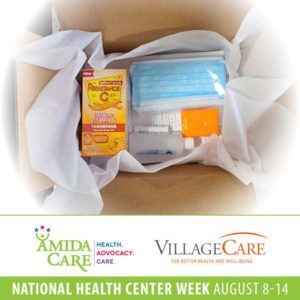 At the height of the pandemic, the VillageCare team delivered care packages to approximately 5,000 members who were at the highest risk of COVID-19. The care packages contained immunity booster c-packs, hand sanitizer, lip balm, masks, gloves and a magnet listing important health care numbers for members.
At the height of the pandemic, the VillageCare team delivered care packages to approximately 5,000 members who were at the highest risk of COVID-19. The care packages contained immunity booster c-packs, hand sanitizer, lip balm, masks, gloves and a magnet listing important health care numbers for members.
Along with the care packages, VillageCare implemented a cloud-based telephone system and automatic call distributor (ACD) platform that allowed better productivity and reliability for clients and members. The ACD platform improved the overall efficiency and member experience by enabling various communication channels including phone, email, chat, and call back. The real-time dashboard, quality management tool and workforce optimizations suite provide the call center team with the ability to better manage member satisfaction.
Other actions taken by VillageCare during the COVID-19 pandemic included a dedicated staff to schedule COVID-19 vaccines; partnership with the city scheduling system and community-based organizations; participation in the City of New York COVID-19 home bound vaccination program, and a Member Newsletter, flyers and postcards highlighting facts and myths about the vaccine.
Thank you to all of our sponsor providers and to CHCs everywhere for their unwavering commitment to community health, especially during the COVID-19 pandemic!

